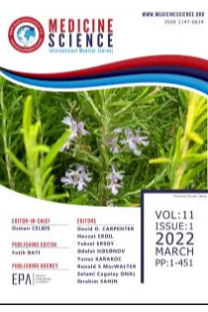Relationship between first trimester vaginal bleeding and the risk of placental abruption
___
Hossain R, Harris T, Lohsoonthorn V, et al. Risk of preterm delivery in relation to vaginal bleeding in early pregnancy. Eur J Obstet Gynecol Reprod Biol. 2007;135:158-63.Weiss JL, Malone FD, Vidaver J, et al.; FASTER Consortium. Threatened abortion: a risk factor for poor pregnancy outcome, a population-based screening study. Am J Obstet Gynecol. 2004;190:745-50.
Ananth CV, Oyelese Y, Prasad V, et al. Evidence of placental abruption as a chronic process: associations with vaginal bleeding early in pregnancy and placental lesions. Eur J Obstet Gynecol Reprod Biol. 2006;128:15-21.
Petriglia G, Palaia I, Musella A, et al. Threatened abortion and latepregnancy complications: a case-control study and review of literature. Minerva Ginecol. 2015;67:491-7.
Eriksen G, Wohlert M, Ersbak V, et al. Placental abruption. A case-control investigation. Br J Obstet Gynaecol. 1991;98:448-52.
Esmon CT. Does inflammation contribute to thrombotic events? Haemostasis. 2000;30:34-40.
Elovitz MA, Baron J, Phillippe M. The role of thrombin in preterm parturition. Am J Obstet Gynecol. 2001;185:1059-63.
Saraswat L, Bhattacharya S, Maheshwari A, et al. Maternal and perinatal outcome in women with threatened miscarriage in the first trimester: a systematic review. BJOG. 2010;117:245-57.
Huynh L, Kingdom J, Akhtar S. Low pregnancy-associated plasma protein A level in the first trimester. Can Fam Physician. 2014;60:899-903.
Gupta S, Goyal M, Verma D, et al. Adverse pregnancy outcome in patients with low pregnancy-associated plasma protein-A: The Indian Experience. J Obstet Gynaecol Res. 2015;41:1003-8.
Conover CA, Bale LK, Overgaard MT et al. Metalloproteinases pregnancy associated plasma protein A is a critical growth factor during fetal development. Development. 2004;131:1187–94.
Ananth CV, Wapner RJ, Ananth S, et al. First-Trimester and SecondTrimester Maternal Serum Biomarkers as Predictors of Placental Abruption. Obstet Gynecol. 2017;129:465-72.
Spong CY, Ghidini A, Walker CN, et al. Elevated maternal serum midtrimester alpha-fetoprotein levels are associated with fetoplacental ischemia. Am J Obstet Gynecol. 1997;177:1085–7.
- ISSN: 2147-0634
- Yayın Aralığı: 4
- Başlangıç: 2012
- Yayıncı: Effect Publishing Agency ( EPA )
Value of hysteroscopy after one in vitro fertilization failure
EMİNE ÖNCÜ, SÜMBÜLE KÖKSOY VAYISOĞLU, YASEMİN GÜVEN, EZGİ ÖNEN, Ebru RAVLİ BULUT, Hüsniye ÇEKİÇ, Filiz ÖZTÜRK
Haloperidol decanoate-induced acneiform eruption: A case report
İhsan AKSOY, Mehmet Hamdi ÖRÜM
The effect of physical activity level at postpartum period on quality of life and depression level
Acromegaly with metastatic renal cell carcinoma: Lung, gluteal and scapular metastasis
Ziynet ALPHAN ÜÇ, Özgür DEMİR, Suheyla GORAR, Sevim GÜLLÜ
Identification with mitochondrial DNA typing from one sperm cell isolated by micromanipulation
EMEL HÜLYA YÜKSELOĞLU, Esra BAYHAN, Gülten RAYİMOĞLU, FATMA ÇAVUŞ YONAR, Kadir DASTAN
Evaluation of BT uricell1280 automated urine sediment analyzer performance
MÜJGAN ERCAN KARADAĞ, Esra FIRAT OĞUZ
Oral electric injury in a child as a result of a home accident
Mehmet Tahir GÖKDEMİR, Özgür SÖĞÜT, Halil KAYA, Hasan BÜYÜKASLAN, Mehmet Özgür ERDOĞAN
